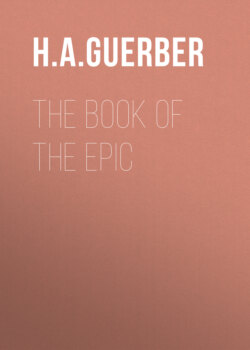Читать книгу The Book of the Epic - H. A. Guerber - Страница 5
На сайте Литреса книга снята с продажи.
FOREWORD
ОглавлениеTable of Contents
Derived from the Greek epos, a saying or oracle, the term "epic" is generally given to some form of heroic narrative wherein tragedy, comedy, lyric, dirge, and idyl are skilfully blended to form an immortal work.
"Mythology, which was the interpretation of nature, and legend, which is the idealization of history," are the main elements of the epic. Being the "living history of the people," an epic should have "the breadth and volume of a river." All epics have therefore generally been "the first-fruits of the earliest experience of nature and life on the part of imaginative races"; and the real poet has been, as a rule, the race itself.
There are almost as many definitions of an epic and rules for its composition as there are nations and poets. For that reason, instead of selecting only such works as in the writer's opinion can justly claim the title of epic, each nation's verdict has been accepted, without question, in regard to its national work of this class, be it in verse or prose.
The following pages therefore contain almost every variety of epic, from that which treats of the deity in dignified hexameters, strictly conforms to the rule "one hero, one time, and one action of many parts," and has "the massiveness and dignity of sculpture," to the simplest idylls, such as the Japanese "White Aster," or that exquisite French mediaeval compound of poetry and prose, "Aucassin et Nicolette." Not only are both Christian and pagan epics impartially admitted in this volume, but the representative works of each nation in the epic field are grouped, according to the languages in which they were composed.
Many of the ancient epics are so voluminous that even one of them printed in full would fill twenty-four volumes as large as this. To give even the barest outline of one or two poems in each language has therefore required the utmost condensation. So, only the barest outline figures in these pages, and, although the temptation to quote many choice passages has been well-nigh irresistible, space has precluded all save the scantiest quotations.
The main object of this volume consists in outlining clearly and briefly, for the use of young students or of the busy general reader, the principal examples of the time-honored stories which have inspired our greatest poets and supplied endless material to painters, sculptors, and musicians ever since art began.
